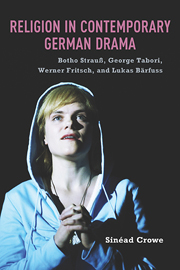 Religion in Contemporary German Drama
Religion in Contemporary German Drama Book contents
- Frontmatter
- Contents
- Acknowledgments
- Introduction: Definitions and Themes
- 1 The Relationship between Theater and Religion
- 2 Religion in Modern European Theater and Drama
- 3 “No One Wants to Get to God Anymore”? Botho Strauß's Groß und klein and Die eine und die andere
- 4 Theological Farce: George Tabori's Mein Kampf
- 5 “The Last Refuge for Metaphysics”: Werner Fritsch's Theater Theory
- 6 “The Feeling of Faith”: Fritsch's Wondreber Totentanz and Aller Seelen
- 7 Belief and Unbelief in the Twenty-First Century: Lukas Bärfuss's Der Bus (Das Zeug einer Heiligen)
- Conclusion
- Bibliography
- Index
3 - “No One Wants to Get to God Anymore”? Botho Strauß's Groß und klein and Die eine und die andere
Published online by Cambridge University Press: 05 May 2013
- Frontmatter
- Contents
- Acknowledgments
- Introduction: Definitions and Themes
- 1 The Relationship between Theater and Religion
- 2 Religion in Modern European Theater and Drama
- 3 “No One Wants to Get to God Anymore”? Botho Strauß's Groß und klein and Die eine und die andere
- 4 Theological Farce: George Tabori's Mein Kampf
- 5 “The Last Refuge for Metaphysics”: Werner Fritsch's Theater Theory
- 6 “The Feeling of Faith”: Fritsch's Wondreber Totentanz and Aller Seelen
- 7 Belief and Unbelief in the Twenty-First Century: Lukas Bärfuss's Der Bus (Das Zeug einer Heiligen)
- Conclusion
- Bibliography
- Index
Summary
BECAUSE OF ITS STRIKING USE of religious imagery, Botho Strauß's Die eine und die andere: Stück in zwei Akten (The one and the other: A play in two acts, 2005) was cited by Germany's foremost theater journal, Theater heute, as exemplifying religion's twenty-first century “return” to German theater. However, this ignored the fact that religion has been present in the theatrical texts of Strauß — one of Germany's most acclaimed writers and regarded by some as the voice of his generation — since the beginning of his long, prolific career. Indeed, religion played an especially prominent role in Strauß's breakthrough play, Groß und klein: Szenen (Big and little: Scenes, 1978). Strauß's first major critical and commercial success, Groß und klein was widely celebrated as an incisive portrait of West German society in the late 1970s. So here the curious situation emerges whereby a play rich in religious language, themes, and motifs is felt to articulate the Zeitgeist of an advanced capitalist and supposedly secular society — a society in which, according to the play's central figure, Lotte, “niemand will mehr zu Gott” (no one wants to get to God anymore).
This chapter investigates this curious situation by examining the relationship between religious elements and sociocultural commentary in Strauß's theatrical texts. While the focus of the discussion is weighted somewhat in favor of Groß und klein, in which religious signs are most pervasive, I will draw comparisons with Die eine und die andere in order to demonstrate that the fundamental positions explored in the earlier play have barely changed over the intervening decades.
- Type
- Chapter
- Information
- Religion in Contemporary German DramaBotho Strauß, George Tabori, Werner Fritsch, and Lukas Bärfuss, pp. 49 - 66Publisher: Boydell & BrewerPrint publication year: 2013


